Another book tour is in the books and this one was different and more productive in many ways compared to my previous U.K. tours. First, the climate crisis is now front and center in the media in the U.K. and around the world. Second, related to the first point, there were larger audiences for my presentations than in previous book tours, and those audiences were more engaged, enthusiastic, and receptive to the climate justice themes than ever before. Third, there was much more informal post-lecture follow-up dialogue and laying of groundwork for future engagement and collaboration between individuals and across institutions. All in all, it was a “brilliant” and “smashing” experience.
Listed below is a snapshot of the U.K. book tour schedule. I had actively sought additional lecture opportunities beyond these commitments, at Cambridge and elsewhere, but I was grateful in the end that the schedule remained with these dates because I simply lacked the energy and focus to do more than what this schedule demanded of me. It was logistically exhausting to pack/unpack, settle in, and navigate around so many cities in such a short period.
Although this tour was one-third of the length of my European tour last summer and only involved two countries rather than four, I was absolutely drained mentally and physically by the time I finished my two lectures at the University of Kent. I’m getting too old for this jet-set professional life.
Jan. 10: European Commission (Brussels, Belgium)
Jan. 13: University College London, Global Governance Institute
Jan. 15: University of Aberdeen
Jan. 16: University of Kent
I arrived in London on Thursday and my first speaking engagement was at the London School of Economics, which featured an all-star panel of some of the leading climate justice scholars and practitioners in the world. Things kicked off with a late-breaking and welcome perk to an already exciting event: Lord Carnwath of the British Supreme Court would be joining the panelists for tea in an intimate conference room about 30 minutes prior to the event. I would have posed with him for a photo but I didn’t want to behave like a star-struck rock band groupie, especially at my advanced age – it’s not cool. After our discussion, he asked for my book flyer and business card, in response to which I blushed and giggled like an elementary school girl. So much for maintaining my stiff upper lip among the dignified Brits.
It was so inspiring and engaging to speak with Lord Carnwath about climate justice litigation around the world and the role that courts can play in addressing systemic injustices in society such as governmental failures to regulate climate change adequately in the climate crisis era in which we live. Apart from being exceptionally knowledgeable and genuinely concerned about the issues, he was so down to earth. My frustration with engaging with many American jurists is that they are either so stuffy and/or so full of themselves, I feel like I have to be on my knees to have a conversation with them. Lord Carnwath is a scholar and a gentleman, and a model to which all jurists should aspire. More information about Lord Carnwath’s distinguished career is available here.
Propelled by that inspiring kickoff to the event, things only improved during the panel. As we entered the lecture hall, all of the panelists were pleased to see a massive audience of approximately 250 attendees, many of whom were students (and this event was held one week before the start of classes!) The panel event was an inaugural and highly effective joint initiative on climate change governance between LSE and King’s College London. As such, it featured a moderator and panelists from each institution, each of whom is internationally recognized for her work. I was one of three climate justice scholars on the panel who did not represent one of the host institutions (one was also from the U.S. and other was from Australia, and each of these scholars is among the leading climate justice scholars in the world). The panel also featured one of the litigators in the globally acclaimed Urgenda case.
The panel discussion was scrupulously moderated to elicit a highly engaging and informative dialogue on cutting-edge developments in the field. The Q&A that followed was lively and very productive. We could have gone for another hour given the level of interest from the audience and the number of questions that went unanswered due to time constraints. The post-event dinner with the panelists and moderators was a very enjoyable way to savor the company of these experts and edify our plans for future collaborations.

The LSE panel was an ideal kickoff to my U.K. tour. I am deeply grateful to Dr. Joana Setzer at LSE’s Grantham Climate Institute for facilitating my participation on this outstanding panel. We met in Tarragona, Spain last June where we delivered keynote presentations at a conference there and we remained in touch for further collaboration after the event. Different versions of the LSE climate change litigation panel web page are available here and here. The Twitter feed from the event is available here.

The transition from the LSE panel to my second speaking engagement, a climate change careers panel at the European Commission in Brussels, was a bit harried. Thanks to the lingering vestiges of adrenaline from the LSE event and the insidious effects of jet lag, I was only able to steal a few winks of sleep before I had to pull myself out of bed bright and early the next morning to catch the Eurostar. The Eurostar is a high speed and civilized train that travels under the English Channel to connect passengers between London and Brussels in just two hours. It also connects London and Paris. During my lecture tour, I encountered colleagues who live in Paris or Brussels and commute in and out of London. I would have never imagined that would be possible, but it is, and it’s pretty amazing. It’s always nice to see carbon-friendly technology that is helping make the world more efficient and connected.
Two of the all-star volunteer research assistants on my Climate Change and the Voiceless book, Soraya Ridanovic, LL.M. and Zarije Kocic, LL.M., coordinated my enjoyable and rewarding day visit to Brussels. I enjoyed a brief walking tour with Zarije of the “government center” sector of downtown Brussels, which featured many corporate-style office buildings that were conspicuously devoid of cultural character. It was interesting to see a city center that was “all-business” in this manner and not a mix of business and leisure entities like most major city centers. I seized the opportunity to pose in front of the very official looking EU parliament building for good measure.
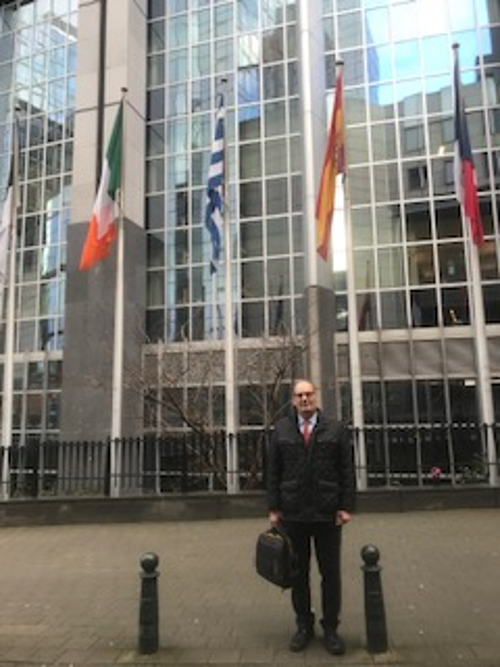
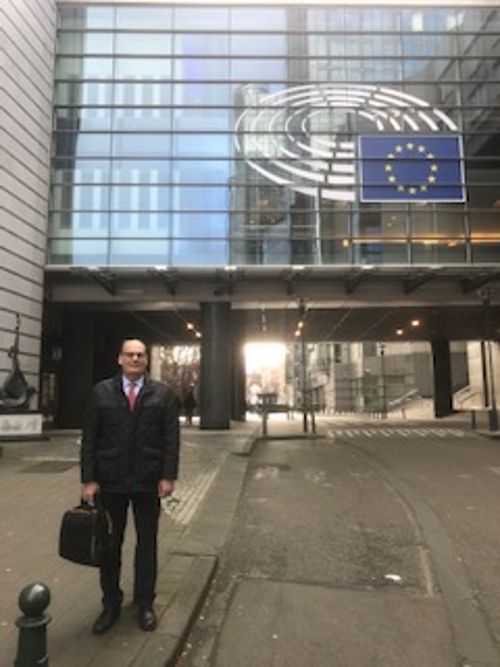
The climate change career panel was a big success. Soraya did an exceptional job coordinating this session for her fellow “Blue Book Trainees” across several departments and disciplines at the European Commission. These trainees are the best and brightest recent graduates from multiple disciplines, many of whom are seeking careers in governance policy, primarily in the EU but also throughout the world. More information on the trainee program is available here.
I was on a panel with a lawyer for the World Wildlife Fund in Brussels and the coordinator of a rights of nature NGO based in Quito, Ecuador (via Skype). I learned a great deal of valuable information from my fellow panelists’ remarks and there was a robust Q&A session from the more than 50 attendees following our presentations. I have had several follow-up e-mail exchanges with Blue Book trainees who attended the sessions and who are seeking additional guidance in charting their potential career paths.

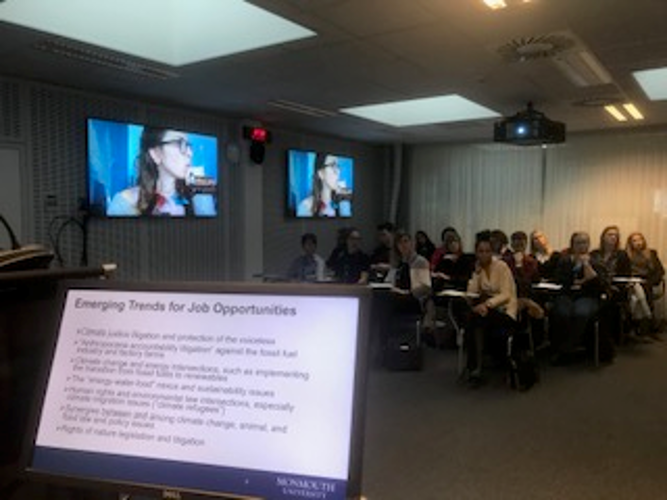
After a full and fulfilling day in Brussels, I returned to London and felt the effects of mental and physical exhaustion start to catch up with me. Fortunately, Saturday and Sunday involved some welcome downtime with my wife, Nigara, who is very familiar with London. We did some sightseeing and extensive meandering around London in milder than normal weather. We enjoyed an informative Buddhism exhibit at the British Library and a hilarious slapstick play, The Play That Goes Wrong, which has received global acclaim. I highly recommend it. More information is available here.
University College London

The second week of my U.K. tour got off to a great start with my Climate Change and the Voiceless book talk at University College London (UCL), one of the U.K.’s top 10 universities along with LSE. Unlike the first two speaking engagements as a panelist on a broader topic, the remainder of my presentations on this tour (UCL, Aberdeen, and Kent) would center exclusively on my book. My book talks began in fall 2018 and will conclude in summer 2020. I am grateful for the input and engagement I have received from audiences around the world on these book talks, but this U.K. tour was without question the most valuable and productive exchange I have had on issues relating to my book. The UCL book talk was a great first step on that path. The room was packed with approximately 75 attendees and “floor-sitting room only” (see photo below), and the post-lecture discussion was great. Like the LSE event, I was particularly impressed with the turnout for this book talk given that it was held in the evening after the busy first day of their spring term.

I am grateful to Dr. Tom Pegram, Associate Professor of Political Science and Associate Director of UCL’s Global Governance Institute, for hosting me for this talk. We enjoyed great discussion and shared ideas for future collaboration over an excellent gourmet vegan Italian food after the event. The web page for the event is available here.
University of Aberdeen Law School

The schedule for my visit to the University of Aberdeen Law School involved arriving in the afternoon on Tuesday, settling into my hotel and catching up on some work, and then joining my host, Dr. Daria Shapolalova, and her colleague, Dr. Roy Partain, for a delicious dinner and great conversation before my 1:00 p.m. book talk the next day. Roy, a globally recognized energy law and policy scholar who recently published a leading text on environmental economics, was a remarkable source of information about Aberdeen in general and the university specifically. He gave me informative tours of the town and campus on Tuesday evening and Wednesday morning in unseasonably pleasant (and sunny!) weather in Aberdeen, which is exceptionally rare for winter (or any other time of year in Aberdeen), so I’m told.
The University of Aberdeen is the fifth oldest university in the U.K. When walking around the stately campus, dotted with castles and cathedrals perched on cobblestone streets, it’s easy to appreciate the rich history of the place. The university has about 15,000 students, which includes a diverse mix of students from all over the world, which I wasn’t expecting in this quaint northern outpost in Scotland. I also learned from the locals that the proper Scottish pronunciation of the town’s name is “Aber-DEEN” (as I soon learned after saying “ABER-deen” and getting politely corrected with the proper pronunciation).
Daria did a wonderful job attending to all the details of my visit, including arranging a valuable opportunity to have lunch with Dr. Mike Radford, a colleague on the faculty who is a leading animal law scholar in the U.K. Mike and I had a great discussion over lunch and I learned a great deal about some of the finer points of U.K. animal law and how it compares to aspects of animal regulation in the U.S.
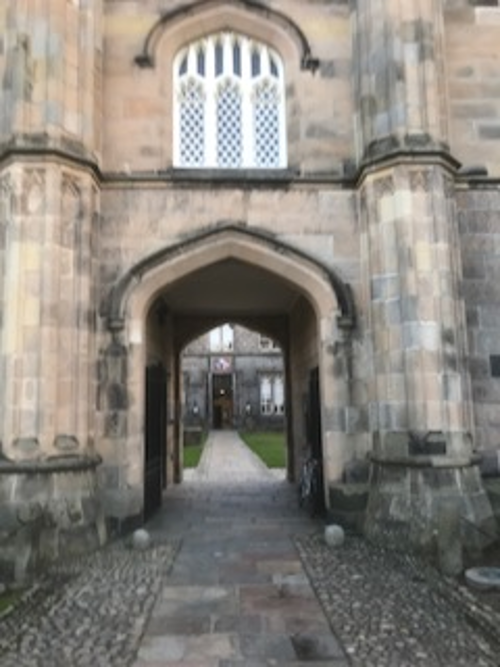


There was another full house of approximately 50 attendees for my book talk, which was again followed by great discussion during and after the lecture from an audience that featured an international mix of professors, graduate students, and undergraduate students from law and other disciplines. The web page for the event is available here, the Twitter feed is available here, and the audio recording with slides is available here.

University of Kent
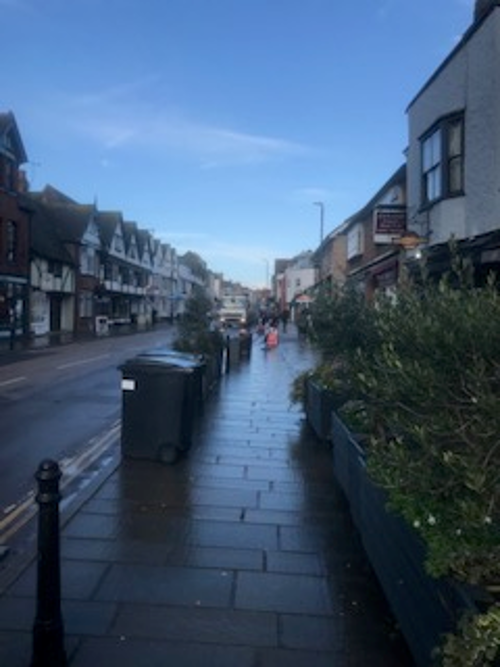
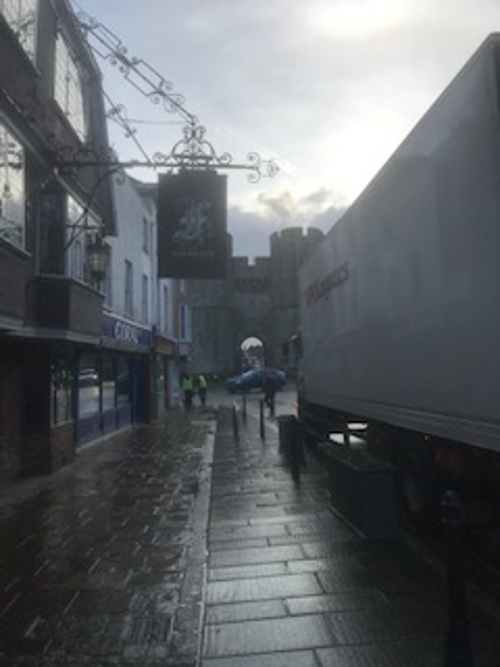
Nestled in the quaint British town of Canterbury, castles and stately charm were also abundant in the last stop of my U.K. book tour at the University of Kent. Although some of the charming historical features from Aberdeen were also evident in Canterbury, Aberdeen is a city of a quarter million residents whereas Canterbury has a small town vibe that is pulsing with pub culture and warm interpersonal bonds. This book talk was arranged by my colleague, Dr. Corey Wrenn, who just joined the Sociology Department at Kent in January 2019. Corey and I overlapped in my first semester at Monmouth and we hit if off famously and stayed in touch after she “flew the coop” for greener pastures in Canterbury. I was so happy to hear and witness how fulfilled Corey is in her new university and home. It was easy to see why Kent and Canterbury are a great fit for her. As an animal protection scholar and a vegan activist, her expertise and passion in these areas is embraced as an asset in her new home and, not surprisingly, she is happy and thriving in that new environment. She is already working with colleagues to build an animal protection specialization at Kent, with an exciting first animal advocacy conference on the horizon at Kent in June 2020 (which I hope to attend) and a newly approved course in Animals and Society that she will soon teach.
The book talk was co-sponsored by other faculty clusters at Kent that work on human-animal relations in disciplines beyond sociology. It was exciting to see the valuable cross-disciplinary synergies that Corey was able to facilitate in a short period of time.


Approximately 40 of Corey’s Kent colleagues and students from several disciplines attended the two book talks I delivered that afternoon. The dialogue was lively once again during and after the presentations. We continued that conversation (on and off topic) over drinks at local Pub with great vegan food. It’s rare to find great vegan food at watering holes in the U.S., so it’s great to see how far the U.K. has come in such a short period in being a leader on vegan options, even in the most unlikely places. On the fast food front, the U.K. has the Beyond Meat meatballs at Subway and the vegan chicken patty at KFC, whereas we are still waiting for the roll out of these exciting menu items in the U.S. The U.K. also has the Impossible Whopper at Burger King, but they call it the “Rebel Whopper.”
The web page for the Kent book talk is available here. The video recording is available here.
May-July 2020 promises to be my biggest and most impactful book tour yet, and it will span several countries. Planning is underway and more details will be available soon.
